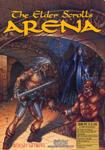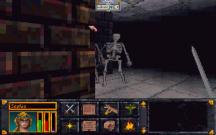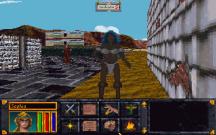The Elder Scrolls: Arena - A Retrospective
With all the current attention being given to Oblivion and its expansions, I thought it might be worthwhile to return to where it all began: TES 1-Arena. Now that it’s available as a free download, and as it works very well in Dosbox everyone who missed it originally can discover for themselves the title which first put Bethesda on the map.
Character creation was quite limited when Arena was released; you were offered two choices: first you could answer a series of questions (similar to the Ultima games) and be told which class to select based on your answers, (there’s a similar system used in Oblivion, so its heritage runs true), or you could choose a class from a previously determined list. After the choice is made, you select a starting race based on geography, choose from a limited number of faces and adjust your starting stats with a small number of free points. Each time you level up during the game, you get a further random number of points to use. Each of the stats control key areas of your character’s development so choose wisely. If you want to be a successful mage, you will need to raise your Intelligence as high as possible over time (100), while if your strength languishes behind, you’ll not be able to carry very much which can be quite annoying when you’re down on the 4th level of a dungeon.
Once your character is finished, you’re ready to begin, and surprise, surprise, you’re locked in a dungeon. Fortunately, a recently deceased female mage’s spirit will offer you some guidance, not only now, but also throughout the game at key intervals. She will tell you how to leave the dungeon and place you on the road to saving the Emperor and the Empire. Don’t rush the first dungeon though, it will act as a tutorial and help you reach at least level 3 or 4 before you exit into the gameworld proper.
The first thing I noticed, was how much the game reminded me of Ultima Underworld - it looks and plays very much like that classic. It’s first person, 3D and you have to swing your mouse to swing your sword. In many ways, despite the vast improvements in the quality of the graphics, the combat mechanics haven’t changed very much over the years. The spell effects are quite mundane by today’s standards, but they do the job. The game does contain one spell which sadly never resurfaced- Passwall. It’s marvellous being able to make any dungeon wall simply disappear.
Dungeons are rectangular and usually have about 4 levels. Monsters spawn regularly, often while resting and are filled with trenches, water, and hidden rooms full of treasure. They are in many ways what the game is all about. The plot itself is incredibly thin, and the cities look very much the same and are populated by hundreds of people who all look the same. The main function of the NPC’s is to give quests (usually in a Tavern, though artefact quests are obtained from people on the streets.) and to tell you where the object of your quest is located.
Quests are many, but simplistic. Escort my niece, retrieve my book, take this message, about sums them up. Still, early on they are a great way to gather both experience and gold. If you stay outside in the streets at night (as opposed to sleeping in a tavern), then you’ll get the opportunity to practise your swordplay and spellcasting as assorted monsters, thieves and mages roam the streets at night, attacking anyone they find. The artefact quests and the ‘main’ quest are a little different, but I’ll leave you to discover them on your own.
Unlike the later editions, Arena allows you to visit the entire world, not just one small area. It also uses fast world travel to save time, though you can exit the cities and walk. There are 3 types of shops, and the owners of each type all look the same. However, what makes shopping more interesting is the opportunity to haggle over price while both buying and selling. This is quite helpful early on when money is scarce and items and spells are expensive. Haggling down the price of a 2500gp spell to 1850gp, gives a certain sense of satisfaction.
Music and sound effects are as limited and tinny as you might expect, though the creepy sounds in the dungeons are worth listening to. The game itself is still fun and addictive for a while, but eventually it becomes tedious, as everything is just more of the same. Things haven’t changed very much over the years, have they!

Information about
Elder Scrolls I: ArenaDeveloper: Bethesda Softworks
SP/MP: Single-player
Setting: Fantasy
Genre: RPG
Combat: Real-time
Play-time: Over 60 hours
Voice-acting: None
Regions & platforms
North America
· Homepage
· Platform: PC
· Released: 1994-01-01
· Publisher: Ubisoft
More information




